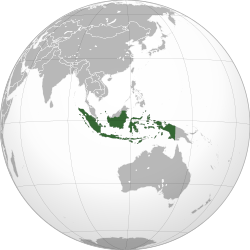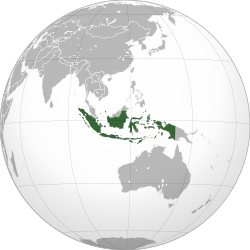Environmental protest in Indonesia denounces Australia’s plastic waste exports

Friday, August 15, 2025
Environmental activists staged a demonstration in front of the Australian Consulate General in Surabaya, Indonesia, on Wednesday (August 6, 2025), calling on the Australian government to stop exporting plastic waste to Indonesia. The protest, organized by the East Java-based non-governmental organization Ecological Study and Wetland Conservation Institute (ECOTON), was attended by an estimated several dozen participants. It presented the dangers of microplastic contamination, which the group claimed has been found in the placentas of unborn babies in the region. ECOTON has not yet disclosed whether these findings have undergone peer review, though the group has previously published other research in scientific journals on microplastics in consumer products.
Wearing hazmat suits and holding life-size baby mannequins, protesters demanded stricter waste regulations and an end to what they described as “environmental injustice.” A banner held at the protest read, “Stop poisoning our children”, referencing scientific findings published earlier this year by ECOTON that revealed the presence of microplastics in human biological samples.

Image: ecoton.
“This is not just about waste. This is about public health and the future of our children. The fact that we are finding microplastics in fetuses is a wake-up call. Australia needs to take responsibility for the waste it sends abroad,” said Prigi Arisandi, an environmental biologist and one of ECOTON’s founders.
According to the group, containers of imported plastic waste often arrive labeled as recyclable, but in practice, much of the material is either incinerated or disposed of near rivers and coastal areas, contributing to ocean pollution and harming ecosystems.
The Australian government has not yet issued a formal response to Wednesday’s protest. A consulate staff member who spoke on condition of anonymity said the consulate “respects the right to peaceful protest” and would relay the concerns to Canberra. In previous years, Australian officials have stated they expect recycling exports to comply with destination-country regulations and that any non-compliance should be addressed through enforcement.
Meanwhile, environmental activists in Indonesia were calling for a regional summit to address transboundary waste and enhance enforcement of the Basel Convention, an international treaty that regulates the movement of hazardous waste.
The protest came amid growing concern over Indonesia’s role as one of the world’s largest plastic waste importers. According to UN Comtrade data cited by news.com.au, Australia exported more than 2.7 billion kilograms of plastic waste to Indonesia between 2020 and 2024, much of it contaminated and not truly recyclable
The protest came amid growing concern over Indonesia’s role as one of the world’s largest plastic waste importers. Several environmental organizations, including LindungiHutan, have echoed ECOTON’s concerns, emphasizing the impact of plastic pollution on mangrove ecosystems and marine biodiversity.

Image: LindungiHutan.
“Plastic waste does not just harm humans, it suffocates mangroves, poisons marine life, and weakens coastal resilience. Our mangrove conservation teams have often found plastic tangled in the roots of young mangrove trees in Central Java and Jakarta Bay. We believe community awareness and upstream waste reduction are key,” said Siktiyana, Marketing Manager at LindungiHutan.
LindungiHutan, which works with local communities and some brands to restore degraded coastal areas, has launched several collaborations education campaigns this year in response to the increasing plastic burden on mangrove forests.
Australia, like several developed countries, has faced criticism for offshoring its plastic waste to Southeast Asia. Although reforms were introduced in 2021 to restrict plastic exports, loopholes reportedly allow some types of waste to still be shipped abroad under the category of “recyclables.”











